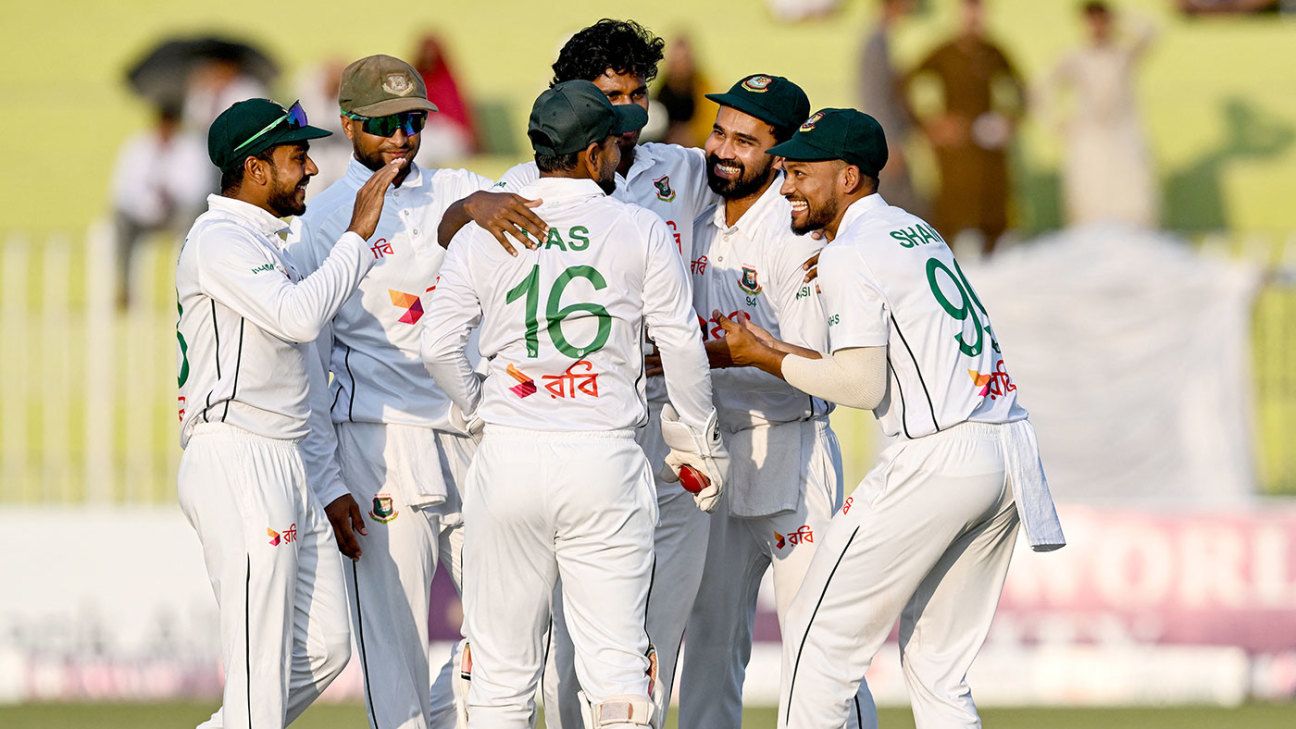‘When we came back from 26 for 6, it was a new dimension’: how Bangladesh pulled off their greatest feat

The staff and security personnel in the media centre had taken selfies with the Bangladesh captain, and he was walking, relaxed, taking in the compliments. Then the question.
“Shanto, what is the secret to this 2-0 win?”
“One word: belief,” Shanto said, his hand on his heart.
Shanto had his work cut out, but he had at his disposal two veterans, a couple of Test specialists, an encouraging group of fast bowlers, an able wicketkeeper, and a hungry allrounder. Off the field it was an interesting mix. Bangladesh’s head coach, Chandika Hathurusinghe, had faced criticism, and chief selector Gazi Ashraf Hossain had only returned to the BCB earlier in the year after a decade in administrative hiatus. At least Rabeed Imam, the experienced manager, brought a calming presence.
One of the things Shanto was especially pleased about was the team-first ethos that marked the tour. He called it one of the hallmarks of the series win. Every batter who got a start made sure he capitalised, in terms of time spent at the wicket, or runs scored. The fast bowlers pounded in all day as a pack.
“In the past, we have had many individual performances in the team,” Shanto told ESPNcricinfo in Rawalpindi. “This time, every player contributed to the team’s exact requirement. They thought about the team first. They were only worried about the team. Nobody looked for personal milestones.
A member of the touring party who requested anonymity echoed the captain’s sentiments. “Bangladesh were a treat to watch on this tour,” he said. “There’s a definite change in mindset among the younger lot. We had to take nine wickets on the fifth day [of the first Test] when Shoriful [Islam] told everyone loud and clear that we will win the game. It showed that he had the desire [and was ready to work to make it come true].
“Mehidy had a huge role. He bowled beautifully, and then made those telling contributions from No 8. The way he looked hungry and eager to be in the wicket safter his half-century in the second Test, it gave a different vibe to the team. When we [came back into] the contest from 26 for 6, it added a new dimension to this team.
“We don’t do these kinds of things. The incredible partnership between Litton and Mehidy suggested to the whole dressing room that we can turn the game from any situation.”
“[Shadman and Zakir] approach the way they bat and their individual innings in different ways, and as such, both had their own particular areas that they were working on pre-series. However, decision-making is vital, and as a batting group we discussed the importance of time and making the opposition bowlers come back for four-plus spells. This was something that we identified after the Sri Lanka series in March.”
Thankfully, Litton and Mehidy stepped up in both Tests. Litton’s taking the attack to Naseem Shah in the first Test – off whom he scored 18 runs in an over at the end of the third day – blunted Pakistan, and then he put on that epic 165-run stand with Mehidy that changed the course of the second Test.
“Litton is a very talented and experienced all-round player,” Hemp said. “What was impressive was his discipline and patience to absorb pressure, and then additionally his awareness to exert pressure the other way by attacking the bowling at key moments.
“Mehidy again made significant contributions at critical moments with the bat. He is naturally an attacking player, which is a big strength, so it can be a challenge to navigate what to do in certain situations, but this series his decision-making and approach was outstanding.”
Shanto’s on-field presence was noticeable, though his batting form continued to suffer in Pakistan – even if his final innings in the series suggested it might be returning. But there was a spring in his step, and his was often the loudest voice on the field. He spoke to his bowlers regularly, and he was proactive in changing them around. He stuck to his plans and did not shy away from attacking Pakistan’s best batters. Shanto’s clever use of spinners on two occasions – the fifth day of the first Test and the first day of the second – was also impressive. Often, he kept the slip cordon intact but also employed in-and-out fields for set batters. Overall, he and Hathurusinghe read the conditions better than Pakistan.
“I am in the slips for a while, then I am at mid-on or mid-off at other times,” Shanto said. “My fielding position depends on who is bowling. Sometimes it is hard to speak to Nahid Rana from the slips. I spend time next to him, to give him instructions. Once he gets it, I can field anywhere. Sometimes I have to stay there for Hasan Mahmud. I don’t have to do the same for Taskin. I thought the bowlers gave me exactly what I wanted from them.”
He now possesses arguably Bangladesh’s best bowling attack in years, fast bowlers who can win him matches, and two of the world’s leading spinners. But Shanto’s future as the captain isn’t all rosy. His brief when he was handed the captaincy last November was to take Bangladesh cricket into the future. Stating it that way elides the fact that it will be a future without a golden generation of players who defined Bangladesh cricket – the likes of Shakib and Mushfiqur, Tamim Iqbal and Mahmudullah.
One of the more unusual things about this tour was the lack of influences from outside the team. For years, it had been common practice for the former board president, Nazmul Hassan, and some BCB directors to travel on tours. They would sit in on team meetings and talk to players and coaching staff every now and then, in the team hotels and elsewhere.
“In the team, everyone knew their specific roles,” said Imam, the team manager. “They knew what was expected of them. It was a very cricket-centric tour. We basically stuck to training, matches and hotel. We had our rooms side by side and on the same floor. It created an atmosphere of togetherness. They spent their spare time with each other. It was good to see that cricket was the only thought during a tour.
“News did come through but the focus never wavered. The coaches and support staff, we tried to make them comfortable. We were together all the time. There were no distractions. Rather, we received a lot of encouragement from the board and from home.”
Not that things didn’t get tense in the dressing room. Rabeed, who has worked at the BCB for close to two decades, spoke of how he got to pacing when the team fell to 26 for 6 in the second Test.
“I wasn’t feeling comfortable anywhere. I didn’t feel like standing or sitting anywhere. I was thinking of going towards the dugout. When I was coming down the dressing room stairs, Miraz hit a boundary. He struck one more, and then I just sat midway down the stairs. I decided to sit there throughout [Mehidy and Litton’s] 165-run partnership.
Given the side has eight Tests from August through December, the BCB sent the high-performance team to Australia and the Bangladesh A team to Pakistan in advance to prepare. Several of the Test squad members, like Mushfiqur and Mominul, played for the A team in Islamabad ahead of the first Test. The Test team ultimately had to rely on six days of practice in Lahore and Rawalpindi, but they were well prepared and acclimated to the conditions.
If Shanto felt vindicated after winning the first Test he looked relieved and content after the second, posting a photo of himself asleep next to the trophy. He reflected later that no matter what direction the team took from there on, they will always have this 2-0 result in Pakistan.
“It feels great when you are winning. It is important to enjoy these moments. I think such a moment has never come in Bangladesh team’s history. Cricketers look for references. Now we have one. We know that we have the ability to win abroad.
“It was from my belief after seeing how hard the players worked. The way they showed hunger for the team, it gave me the belief. Results can vary in these situations. If we can stick to this process, work hard, we can do even better.”
They have a reference. And they also now have the belief.
Mohammad Isam is ESPNcricinfo’s Bangladesh correspondent. @isam84
Related
‘Listen from one ear, ignore from the other’: Former India…
India's Rohit Sharma and Mohammed Shami (AP Photo) NEW DELHI: Former wicketkeeper-batter Syed Kirmani has expressed his opinion that experienced fast bowler Mo
India faces New Zealand in budding rivalry at Champions Trophy…
State AlabamaAlaskaArizonaArkansasCa
ICC and Unilever announce landmark partnership on International Women’s Day…
The two-year partnership, kicking off at this year’s Women’s Cricket World Cup in India and running until the end of 2027, marks the world cricket governing
IPL 2025: Mumbai Indians sign Corbin Bosch as replacement for…
Mumbai Indians have signed South Africa all-rounder Corbin Bosch as a replacement for his injured countryman Lizaad Williams for this year's Indian Premier Leag











